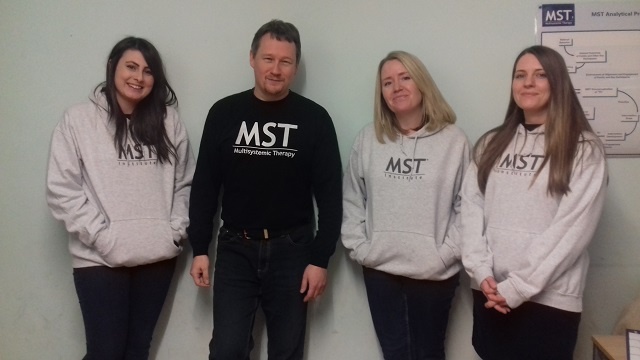This young boy was headed to placement, but MST helped him remain in the home
Kyle* made it clear to his parents that they had taken “everything away” from him and didn’t understand him. He took out his anger by getting into trouble. Stealing, joy-riding, using drugs, hanging out with friends who were bad influences. And the police constantly knocking on the door.
Kyle’s parents sought help from four different services that achieved different levels of success. But at the end of the day, Kyle showed little improvement, the police kept arriving with the boy moving closer and closer to placement. The mother remembers “the worst was the feeling you had failed as a parent that you hadn’t done enough, and this was our fault.”

Members of the Action for Children Wigan MST team, above
It got to the point that the parents dreaded going home when Kyle was at his worse. They would do anything to stay at work where, at least, they felt in control. “Home was not a nice place to be. It was a battle zone, and every day was a different war.”
The family had reached the same point many medical patients do. They thought they had come to the end of possible treatments. Without that hope that there was something else out there, despair sets in.
Help arrives with MST
In the case of this family, however, there was something else out there—Multisystemic Therapy (MST).
Through the Action for Children agency, the family was assigned to MST and its therapist, Tom. They expected a “quick fix,” which, of course, is not what MST is about. It takes a lot of hard work, trial and error, and time. When Tom explained the process, the mother and father were surprised. “We had never heard of this [approach] before and did not quite understand how this would work.” But they had reached the point where MST seemed the only option. “We had nothing to lose and everything to gain if we were successful.”
Tom got them started looking at Kyle’s many unacceptable behaviours. Then they moved onto figuring out what contributed to them and how to target them. Kyle’s mother said, “I will be honest, I thought that some of the interventions that we came up with, we would not be able to manage them. When we voiced our concern with Tom, he would give us a different spin on how we were seeing it, which made it more real, and he believed in us that we could do this.”
The parents came to realize that they were making a positive contribution to the process, that they had the capability “to change the future for the better.” The mother said, “Working together as a team, my husband and I met up regularly with Tom, and we had time to discuss what we had achieved, what had worked well and what needed tweaking. Once we were able to see that we were making headway, it gave us all the power to strive on to achieve our goal of being a family again working together and supporting our son through this difficult time."
Kyle was obviously out of his depth and needed tools to make positive changes. Tom helped the family find those tools, though it wasn’t always easy. “You may have a couple of days where you think you have cracked it, and then you take five steps back with something that crops up that wasn’t even in the equation,” the mother said.
Parents alter their behaviours
The parents found they had to change how they dealt with issues. They became “very reflective of how our interactions with our son could contribute to his behaviour, and as a family, we began to function very differently.”
One aspect of MST the parents very much appreciated was the out-of-hours service, rather than nine to five, which is often the case. She was also grateful that when a call was put in for help, whoever took the call was familiar with the family and offered support. MST “understands the needs of parents and families and that when everything around you is falling apart, you are there at the end of the phone to help put things back together.”
Therapist’s encouragement
The family credited Tom with being a great source of inspiration. He “helped us through really tough days and supported us with our decisions, judgement. He has been very supportive, and we have thoroughly enjoyed meeting with him in our home to deal with our family.”
The mother said that where they started “was full of darkness, worry, despair, upset and hurt.” But at the end of the MST treatment, their future is “bright, hopeful, happy, balanced.”
“We would recommend MST to everyone. You are a dynamic group who are passionate about your roles and responsibility. This shines through when working with you.”
*Names have been changed to protect confidentiality


